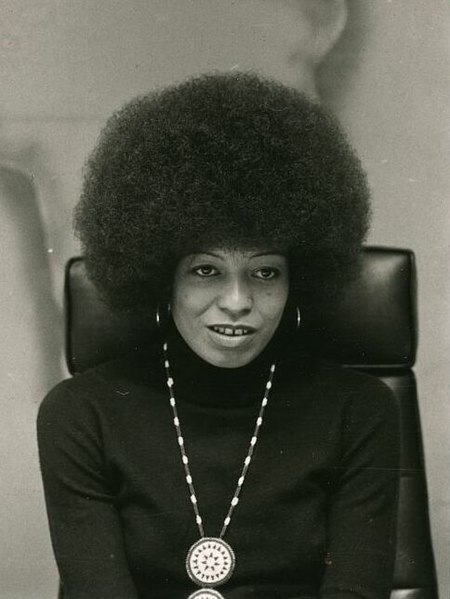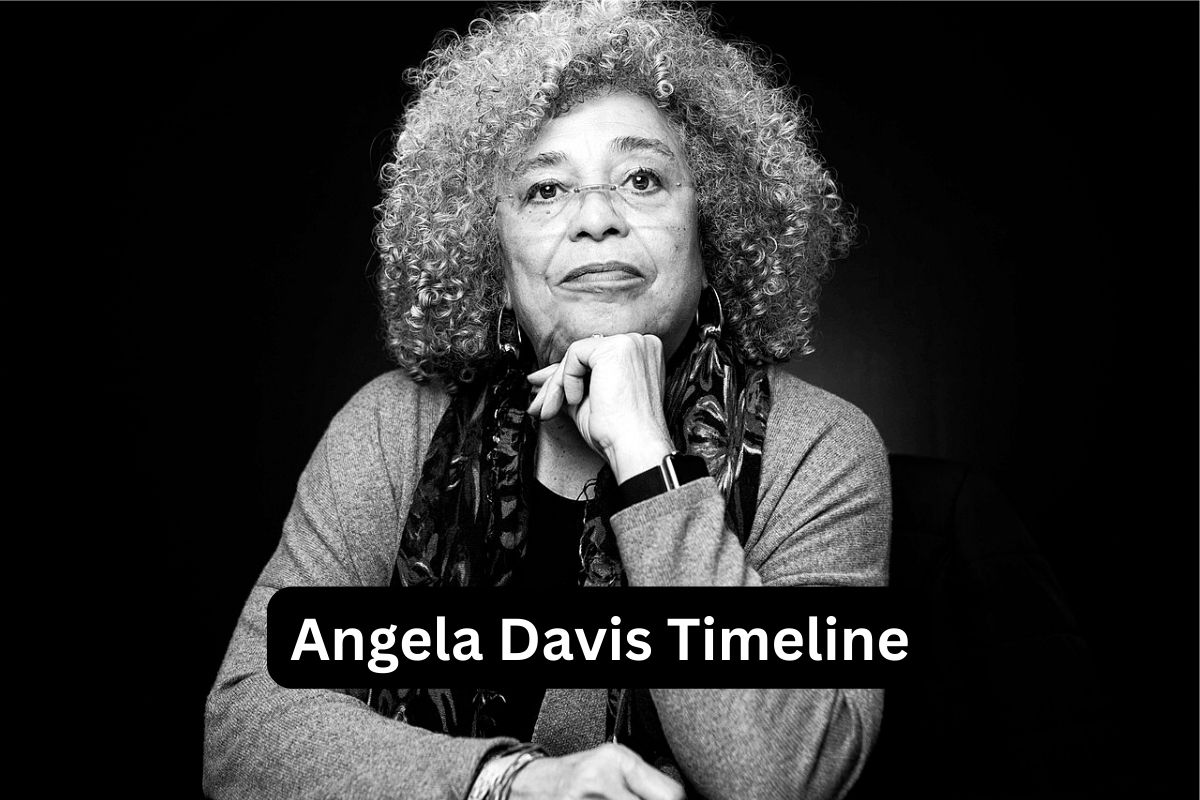Angela Davis is a prominent activist, scholar, and author known for her unwavering commitment to social justice, racial equality, and gender liberation.
Born in Birmingham, Alabama, in 1944, Davis emerged as a central figure in the civil rights, Black Power, and feminist movements of the 1960s and 1970s.
Her work encompasses a wide range of areas, including prison abolition, intersectional feminism, and anti-racist activism.
Davis’s intellectual contributions and courageous activism have inspired generations of individuals around the world, making her an influential figure in the fight against systemic oppression and inequality.
| Year | Event |
|---|---|
| 1944 | Born on January 26th in Birmingham, Alabama |
| 1959 | Attends the Little Red Schoolhouse in New York City |
| 1961 | Enters Brandeis University in Massachusetts |
| 1963 | Studies abroad in France at the University of Paris |
| 1965 | Graduates from Brandeis University magna cum laude |
| 1967 | Begins graduate studies in philosophy at the University of California, San Diego |
| 1970 | Hired as an assistant professor at UCLA |
| 1970 | Arrested and charged in connection with the armed takeover of a courtroom |
| 1972 | Acquitted of all charges |
| 1980 | Publishes “Women, Race, and Class” |
| 1984 | Runs as Vice Presidential candidate on the Communist Party USA ticket |
| 1997 | Publishes “Blues Legacies and Black Feminism” |
| 1998 | Appointed as a professor at the University of California, Santa Cruz |
| 2016 | Documentary film “Free Angela and All Political Prisoners” is released |
| 2020 | Releases the book “Freedom Is a Constant Struggle” |
Timeline of Angela Davis
1944 – Born on January 26th in Birmingham, Alabama
Angela Davis was born in a racially segregated city during a time of deep racial tension and systemic discrimination in the United States.
Growing up in Birmingham, Davis experienced firsthand the injustices and racial inequalities that would later fuel her activism.

1959 – Attends the Little Red Schoolhouse in New York City
At the age of 15, Davis began attending the Little Red Schoolhouse in Greenwich Village, New York City. The school was known for its progressive and innovative approach to education.
Also Read: Facts About Angela Davis
This experience exposed Davis to a more inclusive and intellectually stimulating environment, laying the foundation for her later engagement in social and political activism.
1961 – Enters Brandeis University in Massachusetts
After completing high school, Davis enrolled at Brandeis University in Waltham, Massachusetts. She pursued a degree in French, which allowed her to explore various intellectual and philosophical ideas.
During her time at Brandeis, Davis became increasingly involved in political discussions and activism, which would shape her future trajectory.
1963 – Studies abroad in France at the University of Paris
As part of her undergraduate studies, Davis had the opportunity to study abroad in France at the University of Paris.
This experience exposed her to the intellectual and cultural climate of Europe during a time of significant social and political upheaval.
Paris served as a hub for intellectuals, activists, and revolutionaries, and Davis immersed herself in political theory, Marxism, and existentialism, which would influence her own activism and scholarship.
1965 – Graduates from Brandeis University magna cum laude
In 1965, Davis graduated from Brandeis University with a bachelor’s degree in French, earning honors magna cum laude. Her academic achievements reflected her intellectual rigor and dedication to her studies.
While Davis initially pursued an academic path, her experiences both within and beyond the university would lead her to actively engage in social justice movements and become a prominent figure in the struggle for civil rights and Black liberation.
1967 – Begins graduate studies in philosophy at the University of California, San Diego
In 1967, Angela Davis began her graduate studies in philosophy at the University of California, San Diego (UCSD).
Pursuing her passion for critical thinking and intellectual exploration, Davis delved into the field of philosophy, which would greatly shape her understanding of the world and her subsequent activism.
During her time at UCSD, Davis engaged with various philosophical traditions, theories, and thinkers, broadening her knowledge and developing her own analytical perspective. This period of academic growth laid the groundwork for Davis’s future work as an influential scholar and intellectual.
1970 – Hired as an assistant professor at UCLA
In 1970, Angela Davis was hired as an assistant professor in the Philosophy Department at the University of California, Los Angeles (UCLA). As one of the few black faculty members at the university, Davis brought a unique perspective to her teaching and research.
Her courses explored topics such as Marxism, feminism, and the philosophy of race, challenging traditional academic boundaries and advocating for social justice.
1970 – Arrested and charged in connection with the armed takeover of a courtroom
Later that year, Davis was arrested and charged with kidnapping, murder, and conspiracy in connection with the armed takeover of a courtroom in Marin County, California.
The incident involved the attempted liberation of three black prisoners, and Davis was accused of providing the weapons used in the takeover.
Her arrest sparked a high-profile and internationally recognized legal case that galvanized support from various activist and intellectual communities.
1972 – Acquitted of all charges
After spending 16 months in jail and becoming a symbol of political resistance, Angela Davis stood trial and faced intense scrutiny. In 1972, she was acquitted of all charges by an all-white jury, delivering a significant victory for Davis and her supporters.
The trial shed light on systemic racism and raised important questions about the intersections of race, gender, and political activism.
1980 – Publishes “Women, Race, and Class”
In 1980, Angela Davis published her influential book, “Women, Race, and Class.” In this groundbreaking work, Davis examined the interconnections between gender, race, and socioeconomic factors, highlighting the experiences of women of color within the broader feminist and civil rights movements.
The book challenged prevailing narratives and sparked conversations about intersectionality, becoming a seminal text in feminist theory and activism.
1984 – Runs as Vice Presidential candidate on the Communist Party USA ticket
Runs as Vice Presidential candidate on the Communist Party USA ticket: In 1984, Angela Davis made a foray into electoral politics by running as the Vice Presidential candidate on the Communist Party USA ticket, alongside presidential candidate Gus Hall.
Although the campaign did not result in electoral success, Davis’s candidacy brought attention to socialist principles and issues of racial and economic justice.
1997 – Publishes “Blues Legacies and Black Feminism”
In 1997, Davis published “Blues Legacies and Black Feminism,” a book that explored the contributions of black women in blues music and their impact on feminist thought.
Davis examined the lives and artistic legacies of blues pioneers such as Gertrude ‘Ma’ Rainey, Bessie Smith, and Billie Holiday, shedding light on their experiences of racial and gender oppression and their cultural significance.
1998 – Appointed as a professor at the University of California, Santa Cruz
In 1998, Angela Davis was appointed as a professor in the History of Consciousness Department at the University of California, Santa Cruz. Her appointment further solidified her position as an influential scholar and intellectual.
Davis continued to teach and mentor students while engaging in research and activism focused on issues of race, class, feminism, and incarceration.
2016 – Documentary film “Free Angela and All Political Prisoners” is released
In 2016, the documentary film “Free Angela and All Political Prisoners” was released, directed by Shola Lynch. The film provided a retrospective look at Davis’s life and the events surrounding her arrest, trial, and eventual acquittal.
It delved into her political beliefs, activism, and the global movement that rallied behind her, showcasing her as an iconic figure in the struggle for justice and civil rights.
2020 – Releases the book “Freedom Is a Constant Struggle”
In 2020, Angela Davis released the book “Freedom Is a Constant Struggle: Ferguson, Palestine, and the Foundations of a Movement.” In this collection of essays and interviews, Davis examines the interconnected struggles for liberation and justice around the world.
She draws parallels between movements in Ferguson, Missouri, and Palestine, while exploring the importance of intersectionality and collective action in transformative social change.
Throughout her life, Angela Davis has remained committed to activism and scholarship. She continues to speak at public events, participate in protests and movements advocating for racial, gender, and economic justice, and engage in critical dialogue on various social issues. Davis’s work serves as an inspiration for activists, scholars, and individuals striving for a more equitable and just society.
